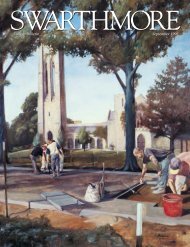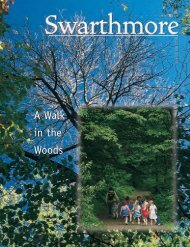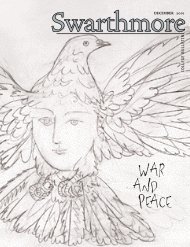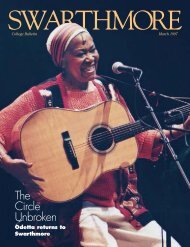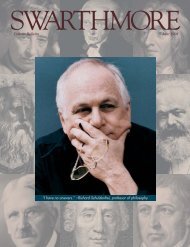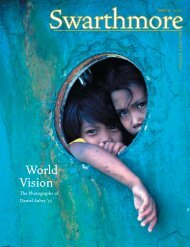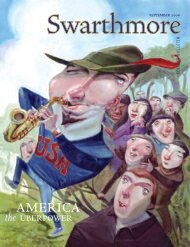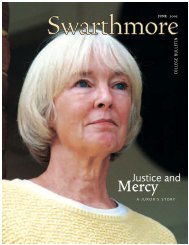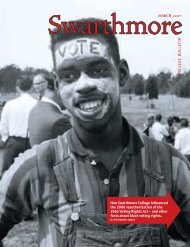WAs aren’t meant to be proofreaders,and although some students will invariablyturn to them, in part, for that purpose,WAs are trained to address thedeeper questions surrounding structure,argument, and organization. MaceraySesay ’07 rarely shows her WAM a draft.Instead, she and Laura Twichell ’06 talkthe assignments out, giving Sesay achance to organize her thoughts anddraw the connections she’ll later put topaper.Allison Balter ’06, special programscoordinator for the WAs, says Swarthmore’sWriting Associates Programstands out for the respect it garners fromstudents and faculty as well as for itsscope. The program recently expanded toserve the community, and some WAs usetheir talents to work with UpwardBound students or do grant writing forarea nonprofits.Schmidt says his committee likely willnot recommend any substantial changes tothe Writing Associates Program. The numberof students who have contact with WAshas more than doubled in the last decade,Schmidt says, and Gladstein has revampedthe curriculum for the WA training coursesince taking over in 2001. But although theprogram’s scope has expanded, the numberof WAs needed has actually decreasedslightly, Schmidt says, with the shift towardsmaller W courses leaving faculty freer tofocus on writing instruction themselves.Yet, at least one member of the Writing ProgramReview Committee, Professor of EconomicsStephen Golub, questions whetherthe appropriate faculty resources are availableto support the smaller and more intensiveWs. The W classes are often half thesize of the vintage PDCs, which generallyhad a 25-student enrollment cap.Not a single tenure-track professor ischarged with the responsibility of teachingacademic writing, Golub points out, and nonew faculty resources were provided withthe switch to the W courses. “The reform isStudents expressed avery Quakerly desirethat professors talkabout their ownwriting struggles—anacknowledgment that“we are just simplyyounger scholarsin the field.”somewhat misguided in that sense. Youcan’t just stipulate a requirement withoutsaying how you will meet it.” Without additionalfaculty resources, Golub says he fearsmuch of the burden for writing instructioncould fall to student WAs rather than toprofessors.The College’s writing reforms would perhapsbest be described as being in draftform, open for revisions. A formal review ofthe W courses won’t commence until2007–2008, under the guidance of a differentcommittee than the one that has overseenthe WAs review, Schmidt says. Manyfaculty members aren’t sure what to expect.“What I’m in suspense about is, do studentsfeel that the W classes deliver a differentialor distinctive outcome? I really don’tknow. I have not gotten any sense as towhat the student buzz is on that, whetherthey feel that a W course reliably delivers akind of writing instruction,” says AssociateProfessor of History Tim Burke, who servedon the Committee on Educational Policywhen the College began its recent curricularoverhaul.When asked, students often give vagueanswers. Many upperclassmen fulfilledtheir requirements under the old PDCs,and freshmen are still getting accustomedto Swarthmore’s course load.However, a spring 2005 survey conductedby WAs indicates that studentsreport, on average, 29 pages of writingin W courses versus 13.3 pages in otherclasses, says Matt Fiedler ’06, the WAscheduling coordinator. The on-line survey,designed primarily to gauge whystudents think writing should be a partof the Swarthmore curriculum, yielded448 complete responses, for a 33 percentparticipation rate. Respondents alsoreported 6.6 writing assignments per Wcourse compared with 3 in other classes.Swarthmore has resisted an institution-widecomposition requirement—the Comp 101 equivalent. The schoolinstead subscribes to the philosophythat writing instruction should be distributedacross the disciplines and classyears. Students gain discipline-specific writinginstruction through the W courses andcan turn to the elective English 001A,Insights Into Academic Writing, for a morestructured study of the writing process. Studentsin 001A read articles on the role ofwriting in the college curriculum while developingtheir own academic writing skills.But 001A, taught by Gladstein and apart-time visiting assistant professor, hasbeen over-enrolled in recent years, Schmidtsays. Enough students tried to register forthe class last fall to fill four sections. Justtwo were offered. The Writing ProgramReview Committee is recommending thatfunds be made available to provide moresections of the course. Schmidt says thecommittee will also request additional fundsto fulfill a faculty desire for more training onhow best to teach writing.Overall, Golub says, the current programworks well because students are talented.However, he thinks some students who needadditional help may be at risk of fallingthrough the cracks.“I still think we struggle. There are stu-28 : swarthmore college bulletin
dents who show up in the senior year withpretty serious writing deficiencies, and youtry to figure out, how did that happen?”Burke says.There’s a balance, he says, betweenensuring that all students have access to theCollege’s resources and padding the curriculumso it catches those few students whostubbornly refuse to find them.There remains a strong will on the part ofmany faculty members and individual studentsto enhance writing instruction. Thiscommitment is leading to innovations anddiscussions never before initiated.Gladstein, with the help of a group ofWAs, has begun a detailed error analysis ofintroductory biology lab reports and a qualitativestudy of the writing experiences of thestudents writing those reports. The workhas energized the teaching of writing in thediscipline, professors say.“There is an evolution of all of us tryingto understand how we write in science,”says Assistant Professor of Biology Jose-LuisMachado. “We thought we knew.”In recent years, Assistant Professor ofBiology Julie Hagelin says introductory biologystudents were presented with a series offormatting guidelines: “Do this, don’t dothat.” The guidelines gave students theincorrect impression that science writing“was somehow fundamentally differentfrom writing a cohesive argument or essayfor another class,” she says. Professors arenow emphasizing the importance of argument,and, for the first time, have devoted abiology lab session to teaching writing.Other faculty members are also highlyengaged with the instruction of writing. AnApril student-faculty discussion on writingand feedback, closed to reporters, markedthe first such dialogue in recent memory.Over Indian food, students and facultymembers chatted about what feedbackworks and what doesn’t. They discussed thedread of finding the words “see me” on apaper: “I swear to you, I never thought thewords ‘see me’ would freak students out somuch,” Assistant Professor of FrenchCarina Yervasi said after the meeting. Studentsalso expressed a very Quakerly desirethat professors talk about their own writingstruggles—an acknowledgment, one studentsays, that “we are just simply youngerscholars in the field.”The stage seems to be set for a larger dialogueamong the community’s various scholars.As Associate Provost Willie says,Swarthmore’s writing program consists ofthe student WAs, the institutional Wrequirement, and the dedication of individualfaculty members to the cause. Althoughthose pieces are not as coherent as on othercampuses, Gladstein says there is a realeffort afoot to better integrate them.But Willie says there likely will be resistanceto any major change, particularly oneinvolving the creation of a more centralizedauthority. “If our current model is workingfor students and faculty, terrific,” she says.“If not, we need to figure out what will bemore effective.” TSince her graduation from Swarthmore, formerwriting associate Elizabeth Redden has been areporter for the Delaware State News. She willenter Columbia University’s graduate programin nonfiction writing in the fall.SOIZICK MEISTER/MEDIA BAKERYjune 2006 : 29



